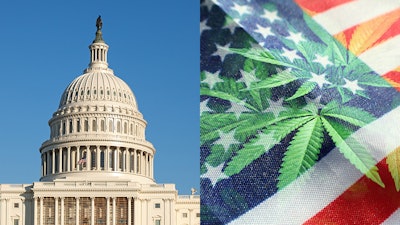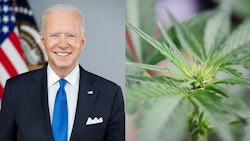
Editor's note: The DEA missed a Feb. 12 deadline to respond to the senators' questions in this letter. Read that story here.
Rescheduling cannabis does not go far enough, according to 12 U.S. Senate Democrats who are now demanding that the Drug Enforcement Administration (DEA) shed light on its review process for the plant.
Sens. Elizabeth Warren, Mass., and John Fetterman, Pa., and Majority Leader Chuck Schumer, N.Y., were among the signees of a Jan. 29 letter sent to DEA Administrator Anne Milgram and Attorney General Merrick Garland, which not only requested that the DEA answer six questions (see below) to offer transparency about the current rescheduling process but also demanded that the federal agency instead deschedule cannabis altogether, as first reported by NBC News.
The letter was also signed by Sens. Cory Booker, N.J.; Jeff Merkley, Ore.; Bernie Sanders, Vt.; Kirsten Gillibrand, N.Y.; Ron Wyden, Ore.; John Hickenlooper, Colo.; Peter Welch, Vt.; Chris Van Hollen, Md.; and Alex Padilla, Calif. While Sanders is an Independent, he caucuses with the Democrats.
The request comes five months after the Department of Health and Human Services (HHS) sent a letter to the DEA recommending that cannabis be reclassified as a Schedule III drug under the Controlled Substances Act (CSA) after conducting an eight-factor analysis on the plant’s accepted medical use and potential for abuse—an analysis that was directed by President Joe Biden.
“Although HHS recommended rescheduling, its analysis could support a decision to deschedule—particularly its emphasis on the fact that marijuana has less adverse outcomes (including less potential of an overdose) and less potential of abuse than substances that are descheduled (alcohol) or scheduled below Schedule III (such as benzodiazepines),” the 12 senators wrote. “The DEA has final decision-making authority and should ultimately deschedule marijuana.”
This “authority,” however, is not limited to the DEA.
The U.S. senators’ Jan. 29 letter comes as they have held a majority in the upper chamber of Congress for the past three years but have failed to bring forward a cannabis legalization measure of their own for a floor vote.
Notably, the U.S. House passed the Marijuana Opportunity, Reinvestment and Expungement (MORE) Act via a 220-204 vote in April 2022, but the Senate never acted on the legislation that would have federally legalized cannabis by removing it from the CSA.
So, while the authority to deschedule cannabis also exists through the legislative process—just as Congress showed when it legalized hemp through the 2018 Farm Bill—congressional leaders are now demanding it be done by the DEA instead.
“Marijuana’s placement in the CSA has had a devastating impact on our communities and is increasingly out of step with state law and public opinion,” the 12 senators wrote, adding that 24 states have legalized adult-use cannabis, and 38 states permit the medical use of cannabis.
“Accordingly, thousands of doctors in those states recommend marijuana to their patients, and millions of patients consume medical marijuana under health care professionals’ guidance each year,” they wrote. “This widespread acceptance of marijuana in medical practice strengthens the HHS’s conclusion that cannabis has a currently accepted medical use.”
Additionally, the senators argued that the United States’ treaty obligations to the United Nations’ Single Convention on Narcotic Drugs of 1961 have changed since the DEA last reviewed how cannabis is scheduled under the CSA.
Previously, and most recently in 2016, the DEA referred to the international drug treaty as support for its rationale that cannabis remains on Schedule I and cannot be rescheduled to anything less restrictive than Schedule II. The DEA did not act on rescheduling cannabis to Schedule II in the past because there was “no acceptable medical use” for the plant in the U.S.
Since 2016, cannabis has been rescheduled under international law—a change that the U.S. and World Health Organization supported in light of “the legitimate medical use” of certain cannabis products, according to the senators.
Now, the senators wrote, the Single Convention has removed cannabis from the most restrictive schedule and placed it in a schedule that requires countries to limit the plant’s use to only “medical and scientific purposes.”
Therefore, the U.S. “can persuasively argue that decriminalizing marijuana activity is consistent with its treaty obligations,” they wrote. “As the U.S. State Department and United Nations have clarified, the relevant narcotics treaties are ‘highly respectful of the legal frameworks of states party’ and ‘allow for sufficient flexibility for states parties to design and implement national drug policies according to their priorities and needs.’
“Furthermore, the treaties are primarily concerned with the trafficking of narcotics ‘having an international dimension,’ rather than purely domestic matters—and research has found that marijuana legalization may actually reduce violent international drug trafficking.”
Therefore, the DEA can “in good faith” interpret its obligations to the treaty, especially now that the HHS has determined (with a recommendation) that cannabis has a recognized medical value in the U.S., the senators wrote.
In conclusion, they said the DEA has never kept a substance in Schedule I following an HHS recommendation for its removal.
“The DEA and HHS should be fully transparent about the evidence relied upon in the course of their review processes,” the senators wrote. “The Biden Administration has a window of opportunity to deschedule marijuana that has not existed in decades and should reach the right conclusion—consistent with the clear scientific and public health rationale for removing marijuana from Schedule I, and with the imperative to relieve the burden of current federal marijuana policy on ordinary people and small businesses.”
To help Americans understand what steps the DEA is taking to act on the HHS Schedule III recommendation, the senators requested the following six questions to be answered by Feb. 12, 2024:
- What is the current status of the DEA’s review of marijuana’s scheduling, pursuant to President Biden’s 2022 directive and HHS’s 2023 recommendation?
- What is the DEA’s timeline for removing marijuana from Schedule I?
- What evidence does the DEA intend to consider in reaching its decision regarding the scheduling of marijuana?
- If the DEA believes clinical trials testing marijuana are necessary in order to change its scheduling, what is the DEA’s roadmap for developing clinical-trial evidence, in light of roadblocks to accessing funding for such studies?
- In the course of this review, is the DEA still assessing cannabis’s medical use based on the five-factor test that the agency created for itself in 1992, which differs from HHS’s analysis?
- Specifically, how (if at all) would the criminal enforcement of marijuana by the DEA change if marijuana were moved to another schedule in the CSA? Please provide an answer for Schedule II, Schedule III, Schedule IV, and Schedule V.
- What specific steps has the DEA taken to ensure that its marijuana-related policies and programs, including its marijuana enforcement strategy, comply with Executive Order 13985 and 14091?
- To what extent does the DEA’s evaluation of marijuana’s scheduling acknowledge or address the harms of cannabis criminalization and related collateral consequences, and racial disparities associated with federal marijuana enforcement?

























